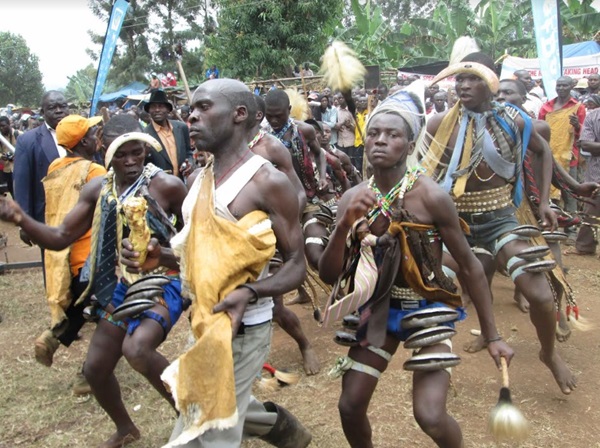
In the Institution of the Umukuuka, We are Spending Sleepless Nights over the Imbalu Launch on Saturday – But Our Detractors are not Sleeping Either
SPECIAL FEATURE | Alfred Geresom Musamali | The Institution of the Umukuuka which oversees the cultural matters of the Bamasaaba (named after Masaaba who is believed to be Original Man) of Kenya, Uganda and the Diaspora is set to officially launch the Imbalu (male circumcision) festival this Saturday, 3rd August, 2024. Uwelukoosi Jude Mike Mudoma, the Umukuuka III will be launching the flagship function at Bumutoto Cultural Grounds in Mbale City, Uganda. Our process, practiced since around 1800 AD, hardens the adolescent males and prepares them for perseverance against the multitude of lifetime challenges ahead, we believe. To begin with, we are partrilineal, insisting that every male borne from an Umumasaaba (singular of Bamasaaba) father is an Umumasaaba, subject to compulsory, non-negotiable Imbalu – and God help any such male who attempts to default! Even if you fled to outer Mongolia, we would trace you out to cut you. And here is the catch – your sexual partner would betray you to us if we were unaware of your status.
The chief guest at this year’s launch, like during many recent years, is expected to be Uganda’s President, Gen. Yoweri Kaguta Museveni who has in turn been requested to invite his Kenyan counterpart Dr William Samoei Ruto. Also invited are cultural leaders from as far as West Africa. His Royal Highness (HRH) Fiti Torgbui Adzonugaga Amenya V, the Paramount Chief of Aflao in Ghana and President of of the Forum of Kings, Queens, Sultans, Sheikhs, Princes and Traditional Leaders of Africa, for instance, jetted into Entebbe International Airport this week with his wife, Queen Fiti Enyonam. His Imperial Majesty (HIM) Dr Suanu Timothy Yormaadam Baridam, King of the Ghenemene and Kasimene VII of the Ancent Bangha Kingdom (Ogon), Nigeria, has also arrived. So has HRH Peter Mumia Nabongo II, King of the Wanga Kingdom in Kenya. On account of the importance of the occasion, we have spent sleepless nights preparing for it but detractors of either the launch process or the entire cultural practice have not been sleeping either. We are, however, not budging in any way from the culture of our ancesters. We are not about to nurture cowardly, fickle men who cannot stand the sight of blood, who cannot even defend their own families in the middist of crises.
Gen. Museveni has donated 33 heads of cattle (one for each of the 26 Ugandan Bamasaaba clans, 3 for the Kenyan clans and the balance for non-clan invited guests) to be slaughtered and roasted at Bumutoto for the day’s festivities which will climax in the official, unanaethetised ushering into manhood of the first Bamasaaba Basinde (uncircumcised boys) of the year. He has also donated UGX300m then instructed Youth and Children State Minister Balaam Barugahare to avail other event management logistics. Barugahare was a private events promoter before he was appointed Minister in a recent Cabinet resuffle.
Bamutoto clan have meanwhile lined up a few Basinde for the function. Singing, dancing, eating, drinking (yes, alcohol!) and other paraphenalia to prepare the Basinde for the unmistakenly sharp Kumubano (knife) of the Umushebi (traditional surgeon) have been ongoing at Bumutoto since the beginning of July.
Tourism authorities have scampered aboard
The Ministry of Tourism, Wildlife and Antiquities (MTWA) has been working with the Institution of the Umukuuka to support what Uganda Tourist Board (UTB) Marketing Manager Clare Mugabi has referred to as a key tourist product in the eastern Uganda cluster. MTWA has, for instance, funded development of many of the branding materials we are using. In addition, a group of Bamasaaba in the Diaspora has contributed UGX30m. Besides, National Unity Platform (NUP) President Robert Kyagulanyi, also known as (aka) Bob Wine, came to Bumutoto on Wednesday to donate UGX5m. Bobi Wine was in the company of John Baptist Nambeshe, the Manjiya County MP who is also NUP Chief Whip in Parliament. Other support has been received from Nile Breweries, the manufacturers of Nile Beer who have secured exclusive rights to sell their range of products at the fete since the singing, dancing, eating, drinking and other paraphenalia of July were begun.
Mbale Northern City Division MP Seth Wambede Massa Kizanji has, however, approached the issue of supporting the circumcision candidates differently. Wambedde hosted the candidates in his electoral area and even beyond to a dinner over the weekend then offered each one about UGx400,000 to go and prepare for the subsequent treatment. We have also received financial and material resurces from many individuals but we are still far short of the over UGX1.2bn we need to adequately handle the bi-anniel event. No amount of support can be said to be too small so we are grateful for all those contributions although some of our detractors would have rather that we had relied on our own megre resources instead of running to strangers with begging bowls to make the ceremony a success.
last night, another dinner was held at Mt Elgon Hotel to mark the first anniversary of Umukuuka Mudoma on the seat. Umukuuka III Mudoma was installed in August 2023, after a lot of succession wrangles with Amlan Wagabyalire that rendered had rendered the seat vacant over an almost three year period since the death of Uwelukoosi Umukuuka II, Sir Bob Mushikori.
Today, though, the fun will move out of the comfort of tourist hotels as well as out of Bumutoto located in an enclave inside the National Forest Authority (NFA) peri-urban forest to perform a parade in the streets of Mbale City. Imbalu Cultural Board Chairman Wilson Watila has explained that Independence Avenue, Naboa Raod and Cathedral Avenue have been closed to motor traffic to give way to the cultural tourism revellers as vendors of food, drinks, souvers and other juggle for business.

Origin of the Bamasaaba is a mix of “…fiction with fact, myth and speculation with historical truth”
Bamasaaba are an ethnic community whose ancestral lands are on the south-western and south-eastern slopes of Mt Elgon (locally also called Masaaba) that towers astride the Uganda-Kenya border. In Uganda, we are also called Bagisu by virtue of our volcanic, formerly coffee and banana rich but now quite environmentally degraded lands falling into the old Bugisu district. Bugisu is one of the 15 original administrative units that formed Uganda at Independence in 1962. In Kenya, however, we are referred to as the Babukusu. If you tried to establish where we came from and how we ended up on the slopes of the over 4,321 metre high Elgon celebrating Imbalu as our flagship rite of passage, you would get lost in, as Professor Timothy Wangusa has pointed out, a mix of “…fiction with fact, myth and speculation with historical truth”. Wangusa is one of the founders of Inzu ya Masaaba (IYM, the House of Masaaba), the association under whose name the Umukuuka I Wilson Weasa Wamimbi (RIP) was recognised in 2010 before Mushikori succeeded him in 2015 then passed on in January 2021, shortly before end of his five year term in office.
In an introduction to American anthropologist James E. Lassiter’s “Circumcision and Coffee in Uganda: Bamasaaba Responses to Incursion, Colonialism and Nationalism 1840-1962,” (CreateSpace Independent Publishing Platform, South Carolina, United States of America, 2017), Wangusa, Bugisu’s (if not Uganda’s) foremost poetry scholar, points out that he artistically reproduces the notion that the single ancestor of Bamasaaba may have emerged from a hole (caldera) on Mount Elgon, or that perhaps he arrived from “the mysterous beyond”. He says, “I attribute the origin of circumcision to NaBarwa the Kalenjin bride of Masaaba, but embellish this by portraying the young couple as proceeding on honeymoon by riding upon a magic cobweb string that stretched from the top of the mountain to BuMutoto”.
No Room for Inzu ya Masaaba – or is there?
But then, even Richard Masereje, the Institution of the Umukuuka Attorney General does not believe in that popping out of a volcano narrative either. He also argues that there is no room for IYM, according to him a Non-Governmental Organisation (NGO) or Company Limited by Guarrantee, in the Traditional and Cultural Leaders (TCL) Act 2011 since the law came one year after creation of IYM and only provides for a cultural leader as a corporation sole. It is as well his conviction that the TLC Act 2011 only covers Bugisu and cannot, therefore, be extended to the Babukusu. Masereje, a Kampala lawyer points out that Gender, Labour and Social Development Minister’s inclusion of IYM in the instrument gazetting Umukuuka III Mudoma was in itself an illegality. Ironically, Masereje and others who insist on the TCL Act 2011 will on Saturday look on helplessly when Uwelukoosi Umukuuka Mudoma saunters into Bumutoto with the IYM branded top gear to laumch Imbalu. Meanwhile, without naming any particular persons, IYM enthusiast and Institution of the Umukuuka Spokesperson Stephen Masiga has warned that there are some persons fighting IYM from within and that in due course they will be isolated and crushed.
Mutoto is just a type of fig tree
Shitoto is a Lumasaaba (Language of Bamasaaba) name for a type of fig tree (pictured). Bumutoto or iMutoto is, therefore, “the village of Shitoto”. There is thought to have been a huge Shitoto (long since been felled) near or even under which, like many romances even in our recent times, the Masaaba-NaBarwa affair flourished and the pioneer circumcision agreed upon. Bumutoto is within the boundaries of present day Mbale City and the ancestral clan around the location are called Bamutoto (singular is Umumutoto). Thus, by launching circumcision in Bumutoto and cutting the first Umumutoto adolescent to mark the occasion, we are going back to the symbolic craddle of the custom. But, says, Lassiter, for Bamasaaba, Imbalu is more than just a physical cut. “… the crafting or creation of a person, a self, is far more a one-time surgical procedure. It is an ongoing education about an inculcation of of the core beliefs, values, and customary behavours of the people, all the people… The Imbalu rite crafts, forms and acknowledges the beginning of a mature adult person. It also confers upon that individual the status of an adulf self with all the duties and responsibilities thereto pertaining”.
The American fell in love with an Umumasaaba lady, gained access through her then wrote one of the most comphrensive books about Imbalu
Lassiter, first encountered the Bamasaaba in 1981 through teaching in Eswatini with an Umumasaaba lady, Immy Rose Namutosi. Having fallen in love and later gotten married, Laissiter acknowledges that, within the activities of the Imbalu rite’s seven phases, there are guidance, affirmation, and sustainance of all Bamasaaba. “Young boys not yet ready for initiation get their first glimpse of what is expected of them during the rite, and their first serious consideration of the values and beliefs associated with manhood”. The American quotes Professor Wotsuna Khamalwa, a Makerere University anthropologist who writes the Second Introduction in the book, as saying, during the Khukhupa/Khuakha Kamamera (millet smearing) phase of Khukoya Kamalwa (brewing the beer), a sister of the Umusinde (circumcision candidate) “stands behind him, and she is smeared together with him. This is powerful symbolism, which underscores the importance, indeed the indispensability of the women folk in the ritual. The sister is, therefore, cast in the role of a wife, since it is with the cows (actually and bulls) she brings home as a bride wealth that the initiated brother acquires a wife for himself. For this reason, she is justified in calling her brother’s wife her own wife. She plays an important role in the welfare of her brother’s family”
Laissiter underscores the importance of an Imbalu candidate’s maternal clan to his succeeding in his initiation into manhood. He quotes Khamalwa as writing, “The maternal uncle has a big say over his sister’s children, and it is virtually inconceivable that a boy would be initiated without first receiving the blessings of the maternal clan. The maternal uncle, who receives the bride wealth of his sister, performs the special role of caring for his sister’s children”.
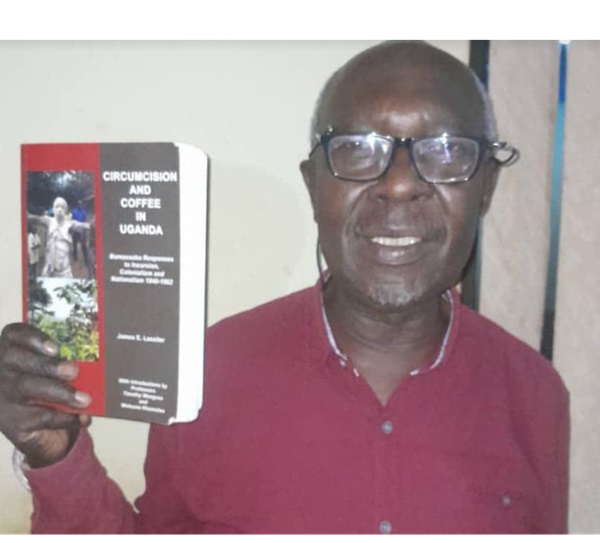
The researcher names seven stages of mbalu. They are Isonja (Initial Group Dance), Khukhwenza (Search for Imbalu), Khukhupaka bulo (Thrashing the millet), Khukoya kamalwa (brewing the beer), Mwikombe (Convalence Period), Khukhwiyalula (Hatching Ceremony), Ineemba (Convocation/Commissioning Dance). However, the Khukoya stage, is the peak of the main festivities and irreversably ends up in that surgical proceedure. According to Laisser, Khamalwa names sub-stages in the Khukoya as Ilutsi (Journey to the stream – to fetch water in a pot for brewing the malwa), Khuakha (elsewhere called Khukhupa) Kamamera during which a paste made out of the millet yeast is smeared all over the candidate’s body. There is also Kumululilo (the third day after brewing, when the frothy stuff is usually ready for drinking and, therefore the day when Umusinde is scheduled for the circumcision. Before that, though, there is Ibukhotsa visiting the maternal uncle for the vital blessing before coming to face the knife. And next is (Khulonga/Khusamba) Mwitosi (visiting the sacred swamp where Umusinde is smeared with its clay or mud, presumably to numb him further). Then there is the apex, Khukhingila (the unanaethetised, public surgical operation). Finally, he mentions Itseko (, the central pillar of outr traditional round, mud houses but in my experience this is earlier because Umusinde’s mother and her fellow women are supposed to sit down and hold firm against this pillar in the understanding that if they panic Umusinde undergoing the surgery outside will as well panic and cry – or worse, urinate on the surgeon and deficate in the pants, an unforgiveable offense with heavy immediate penalities and life long loss of right to speak among fellow men.
Traditionally, Imbalu was lengthy, elaborate and costly but, anyway, the food, drink and time were also not constraints
Traditionally, nobody was ever invited to any homes where Imbalu candidates had been identified because the food, drink and time were not constraints. Instead, young and old folks alike camped from such home to another, eating, drinking and dancing for weeks. Before 1919, the festival used to be after the main harvest season (August) of odd years but great famine that followed the Second World War necessitated the festivities to be postponed by a year. They now take place during even years, on which the misnomer of “Kumwakha kwe Basinde” (Year of the Boys) is applied, implying that the odd year before and after is Kumwakha kwe Bakhana (Year of the Girls). The skip of one year is not only in order to let another cohort of Basinde to mature but also to let the parents to prepare adequately for the elaborate needs of these even univited crowds. The festivities are programmed to begin from Bumutoto then proceed sub-county by sub-county (see programme) until they cover the whole Bugisu sub-region then cross over to the Kalenjin of Sebei, Bagisu’s north-eastern neighbours on the Uganda side. Beyond them to the east are the Kenyan Kalenjin, among them Dr Ruto. There is a repeat of the schedule in December except that it is based on counties rather than sub-counties. Therefore, by inviting Dr Ruto to witness the Bumutoto launch, we are acknowledging the origin (even if it may be fictitious!) of our tradition from his people.
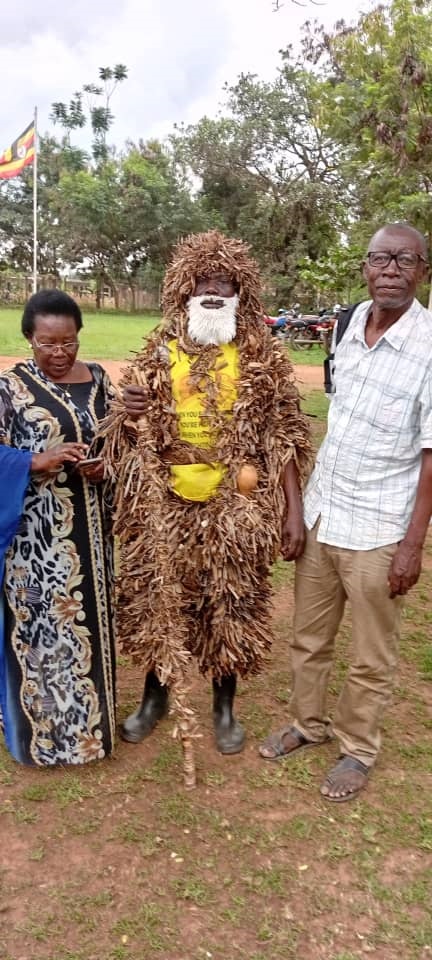
Bamutoto are grumbling, and, perhaps, rightly so
The original assumptions underlying the programming were that Basinde ba Nabyaalo (out of school candidates) were the majority and had the time to go through the elaborate process in August then in December the remaining few Basinde ba Namasamero (school-going candidates) would be subjected to a less elaborate process. This no longer applies due to competing schedules with the Universal Primary Education (UPE) as well as the Universal Post-Primary Education and Training (UPPET). The Ministry of Education and Sports (MoES) calendar provides that primary and secondary institutions of learning close this term on 23rd August. The calendar also provides that universities and other tertiary institutions of that level open for the first semester on 5th August. It, therefore, looks like other than school dropouts there could hardly be any Bamutoto or other Bamasaaba adolescents to subject to our cultural whims come Saturday.
Consequently, some Bamutoto have gone on social media accusing us of not involving them enough in determining the year’s launch. They believe, for instance, that if we pushed the launch ahead by one week, some of the candidates will have written their term’s examinations and would be free to offer their candidature. But our hands are tied – because traditionally the launch occurs on the first weekend of August of the even year. Bumutoto Parish Council to the City Council has, for instance, in addition protested in a television interview that IYM (here comes the confusion with the Institution of the Umukuuka!) has been unlaterally taking key decisions regarding the launch. He also expressed his disatisfaction with power, water and sanitation provisions at the site despite the funds that had been collected by Watila from service providers at the exhibition that has been running for the whole month. Masiga, however, silenced the councillor by publishing photos of the politician very deeply involved in preparatory meetings for the launch.
Wait a minute – are the Bamasaaba personalities spearheading this ceremony themselves circumcised?
Social media has also been awash with doubts as to whether some key personalities spearheading the ceremony are themselves circumcised. Remaining uncircumcised is referred to as defaulting on a debt and eventually complying is Khusasula Likoobi lye Bamasaaba (repaying the Bamasaaba debt).
“We better check some of us masquerading as elders in IYM before we initiate boys this year. Those found still in debt should join the boys and be circumcised instead of posing as organisers of Imbalu,” wrote Engineer Darlington Sakwa, a distinguished elder.
“Those found to have used untraditional channels like going to hospital or being injected with anaesthesia before being cut should (also) be barred from performing any ritual or officiating in Imbalu matters. It is blasphemy to officiate at our revered culture when you are a stranger to the same,” Sakwa added. He said any Umumasaaba circumcised traditionally should be in position to openly give his details of complaince.
The 1995 Republic of Uganda Constution guarrantees each person human rights. Article 24 provides for respect for human dignity and protection from inhuman treatment. It says no person shall be subjected to any form of torture, cruel, inhuman or degrading treatment or punishment. But, never mind! Article 37 provides for the right to culture and similar rights. It says “Every person has a right as applicable, to belong to, enjoy, practise, profess, maintain and promote any culture, cultural institution, language, tradition, creed or religion in community with others. Sakwa, an electrical engineer, represented Bungokho County (where Bumutoto fell at the time) in the Constituent Assembly (CA) that ended in promulgation of the 1995 Consitution although he never appended his signature to it – story for another time! In the raging social media arguments, Sakwa outlined the date of his circumcision (Saturday 31st August 1968), the homestead (Lulwanyi) where the function was held (home of his grandfather Yokana Wabuyi near Bumasikye Primary School, Mbale district), the name of the surgeon (Wolemu) and names of his surviving Bamakooki (cohortmates). He said the Bamakooki are Yefusa Mukwana, Simon Wandyetye, Labani Kususwa and Ben Wawomola.
To me it was obvious, though, that Sakwa was literally poking his fingers into the ribs of Uwelukoosi Umukuuka III whose conformity to the tradition is doubted in some circles. Perhaps prompted by those Sakwa sneers, Uwelukoosi Umukuuka III came out to despell the suspecions. Through his personal assistant Ronald Clyan Gimei, Umukuuka Jude Mike Mudoma said he is the son of Batumayo Mudoma of the Bamayiya sub-clan of Bukwaga, Buteza, Buyobo in the current Sironko district. His grandfather was Malemwa son of Wogido. Uwelukoosi Umukuuka III said he paid the Bamasaaba debt on 11th December, 1974 at the Lulwanyi of his elder brother (cousin, I think!) John Mabolela, son of Tonia Nangai Tonia. Mudoma said he went through the elaborate cultural process of brewing the beer, dancing, going down Mwitosi at Kilayi and was unshaken during the surgery, extremely delighting his relatives and friends. Among the more widely known living relatives he delighted were Hajj Wamusitu ni Jackson Magomu. Mudoma named his surviving Bamagoojji (North Bugisu inflection on Bamakooki) as Leo Mafabi, Lenard Wauyo, John Manana and Sam Gizamba. The Sakwa I know by virtue of sharing residences in Nabumali Town Council of Mbale district will, of course, demand further proof!
Gimei, however, wrote, “So, my brothers and sisters, I expect us to uphold ethics and integrity, other than involving in criminal acts of defaming the person of the Umukuuka and putting his name in disrepute and contempt amongst his subjects”.
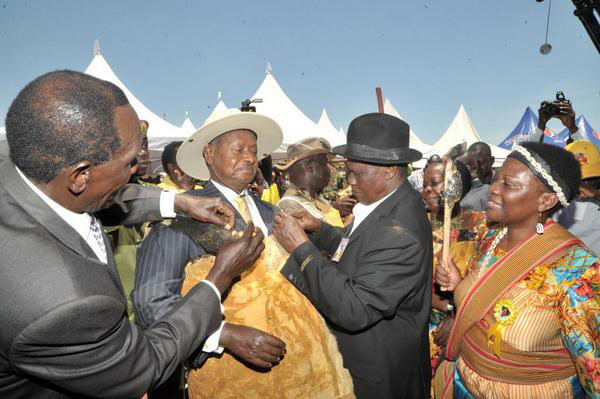
Some Bamasaaba do not even want to hear of Museveni delegating to a female or an uncircumcised man
Some Bamasaaba have demanded that if Museveni does not attend in person then he should only delegate a circumcised man to represent him. This, in a country striving for gender equity, where the Vice-President, the Prime Minister, the Gender, Labour and Social Development Minister and one of the only two ministers from Bugisu are celebrated as female! During the 2022 launch, Gen Museveni was represented by Manafwa district Woman MP and the then also Karamoja Affairs Minister Mary Goretti Kitutu. During the function, Imbalu candidates reportedly got possessed by Basambwa (ancestral spirits) and wondered into the VIP tent, causing a stampede. Unrully revellers also started throwing projectiles at the VIPs who had to be evacuated. Coincidentally of otherwise, Kitutu has since had legal issues, been dropped as minister and even prosecuted in the Anti-Corruption Court. Masiga is quoted as recently saying that the gods communicated (their displeasure) through the elders and warning against repeating past mistakes.
John Diffasi Wabuyi, the head of the 26 clans on the Uganda side also described it as desrespectful for the President to send a female representative. Article 21 of the 1995 Constitution, though, provides for equality and freedom from discrimination. The article says “…all persons are equal before and under the law in all spheres of political, economic, social and cultural life and in every other respect and shall enjoy equal protection of the law”. It adds that “….a person shall not be discriminated against on the ground of sex, race, colour, ethnic origin, tribe, birth, creed or religion, or social or economic standing, political opinion or disability”.
Irene Khayinza Mangali, the Institution of the Umukuuka commissioner for mobilisation, defended the demand for a circumcised dignitary as chief guest. Mangali is quoted explaining that culturally, a woman presiding over the opening of circumcision is an abomination. “It is believed that a woman’s calmness inside the house calms down the boy’s heart to face the knife,” she pointed out.
But Uwelukoosi Mudoma has denied that that is the official position of the Institution of the Umukuuka. On Tuesday, Mudoma personally wrote, “This statement was not an official communication from the cultural institution. All those who were interviewed gave their own thinking about the festival. Therefore, we categorically denounce the statement suggesting that a lady cannot be Guest of Honour during our festival. It does not reflect our values, beliefs or official stance. We believe in the importance of inclusivity, respect, and equal opportunities for all individuals, regardless of gender. Our festival celebrates the rich cultural heritage of our community and we welcome individuals from all walks of life to participate and share in this celebration”.
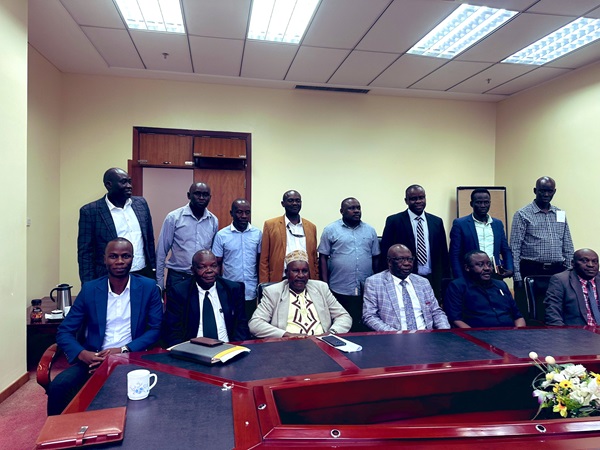
Uwelukoosi Umukuuka III said, “We affirm that women play a vital role in our community and are deserving of equal respect and recognition. We will not tolerate any form of discrimination or exclusion based on gender or any other personal characteristic. Therefore, we look forward to celebrating our circumcision culture with dignity, respect and inclusivity”.
Some Bobi Wine advisers believe in the circumcision but not in the Institution of the Umukuuka
Anthony Natif is a firm believer in traditional Bamasaaba circumcision but dismisses the existance of a cultural institution responsible for organising it in Bugisu. Neither does Treva Mukholi. Both Natif and Mukholi are activists operating under Public Square East Africa, an anti-corruption NGO. Posting on X (formerly Twitter), Natif points out that Mukholi told Bobi Wine this week that when he (Bobi Wine) went to Bumutoto to make his contribution he was duped by persons pretending to be cultural leaders of Bugisu.
“One of the most frustrating things for Gishu folks like myself is to see our current leader @KagutaMuseveni and people who fancy themselves as his replacements like yourself @HEBobiwine deliberately refusing to read Gishu history and pandering to recent political creations just so they convince themselves and their largely non-discerning supporters into believing they have dealt with the Bugisu Cultural Institution,” writes Natif.
“What they are saying is that they created something (well President @KagutaMuseveni and his government did) in 2011 and are somehow forever reinforcing their own creation as a representative of Bugisu. Really, it is not. Bugisu has NEVER had a unified cultural leader until the passing of the TCL Act in 2011,” he added.
Natif points out that if anybody claimed to be that unified authority on the Kenya side he would be circumcised again (a well-known impossibility given that after the scrapping of the skin there remains nothing else loose to cut away).
“Such is the pride of Bagisu and the fiece jealousy with which they their individual independence. The only equaliser is circumcision. No man presides over the other after that,” Natif concluded.
Asked by The Independent Online how he suggested Bamasaaba culture could be preserved during these changing times and in the absence of a unified authority, Natif retorted, “How were we managing before 2011?”. Then he repeated what he had posted in the missive to Bobi Wine.
Moses Khisa, an Umumasaaba scholar based in the United States of America (USA) has in the past expressed disconfort with the use of the expression His Royal Highness to address Uwelukoosi Umukuuka. Khisa warned that the whole idea of creating a king or other royalty for Bamasaaba is allien.
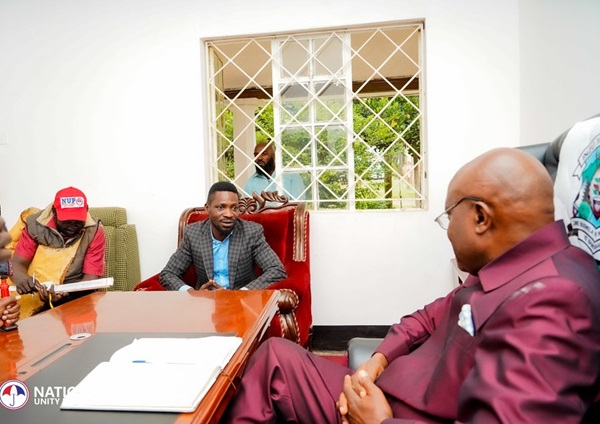
Beggers turned choosers
The donation of cattle for the ceremony and the assignment of non-Umumasaaba Barugahare to provide events management logistics has also hurt the egos of some Bamasaaba.
“The kind of leadership that relies on donations shall not transform ourselves but keep us as beggars and dependants,” wrote Dr Eddy Komoli, who describes himself on Facebook as the head of the United Development Scheme in Uganda.
“When shall we reclaim our position of donating to other societies like it were at Independence whene BCU (Bugisu Cooperative Union), donated funds to build some (secondary) schools (in other sub-regions)?” adds Dr Komoli who is also the custodian of Shilindwa sha Masaaba in Busano, Mbale district. According to Komoli, Shilindwa, about 10 kilometres away from Bumutoto, is where Masaaba lived. His descendants come to Shilindwa to be blessed in a ritual called Khubiita (blessing by selected elders partaking of some malwa but, instead of swallowing it, spraying it at the Umusinde and his troupe). Shilindwa is maintained through community labour and its custodians receive contributions of cattle, goats, chicken and bananas. The community frowns upon receiving upon contributions from persons who do not belong to the clans destined to maintain Shilindwa.
Dr Ahamada Wakhweya, a university lecturer compared the way the Bamasaaba behave with how university students beg around for resources. “They just beg, eat everything and wait for another turn to beg. No investment plan or idea for self sustanance,” said dr Wakhweya.
Even Masereje is not happy with how Bamasaaba contribute minimally for development resources and expect strangers to bail them out.
“We went begging and beggars have no choice… We have been begging for the last 15 years to carry out our own duties because we are disorganised. The only thing we may be good at is quarrelling and fighting over kamalwa. We need to rise above this by having a strong grassroots structure. We have about 2000 grassroot clans in Bugisu. Surely if we have a proper system each clan can raise 100k for this function,” said Masereje.
“People like to hear only bad news. If government failed to offer a hand, (negative) messages would (by now) be flowing rapidly on the (WhatsApp) platform. But when campaigns for unity and calls for development contributions arise, everyone presses the mute burton. We (instead) like negative motivation,” added Masereje. He asked whether it is in our DNA to keep promoting intrigue, arrogance and selfishness.
Engineer Sakwa said it is an insult to go begging to fulfil a cultural tradition that spans centuries.
“Our clan heads organised the bulls, he-goats and cocks to handle our circumcision very well without involving other (distant) families, leave alone other tribes that have nothing to do with our culture❗Commercialisation of our culture has been orchestrated for individual gains, making us a laughing stock. How can we claim to be proud of our culture when we draw budgets and appeal to others to finance (them)? It is like begging for money to organise a send away ceremony for your daughter whom you have seen grow to maturity,” said Engineer Sakwa.
Reacting to the reference to marriage, Elizabeth Kakai from academia pointed out that those, too, have been commercialised because introductions and weddings are foundations of begging and guys taking huge loans to impress (their inlaws) – consequently, guys start off indebted and embittered, ending up in joyless marriages.
Kakai reminded us that the circumcision culture has existed from time immemorial and by now we should have established its system of provisioning. For instance, she said, it is well known that 2026 will be Kumwakha Kwe Basinde and is only another 24 months away.
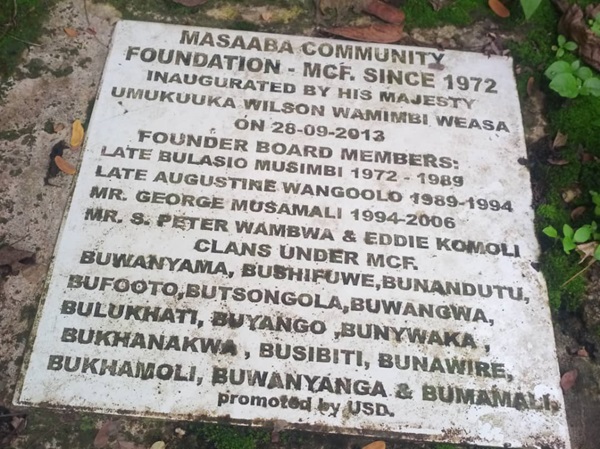
“A responsible people should immediately project what resources shall be required to for it. Strategic planning should already be in place even up to 2030 – especially now that we have the latest population statistics that can be used to project how many Basinde could by then be ripe for the knife,” said Kakai.
“Otherwise, we must repent and turn to God the Creator of heaven and earth for taking His covenant and desecrating it for promoting selfish desires and evil behavior,” she added.
To some modern day Bamasaaba at the Cross-Roads hesitation lingers on, among most foreigners this torture makes no sense
Imbalu is the cornerstone of the Bamasaaba culture. There are health risks associated with the traditional knife, transmission of HIV/AIDS being only one of them. There is also the human rights issue of the process being compulsory for every Umumasaaba male. Article 20 of the 1995 Constitution guarrantees fundamental and other human rights and freedoms. It says, “Fundamental rights and freedoms of the individual are inherent and not granted by the State” and adds that “The rights and freedoms of the individual and groups enshrined in this Chapter shall be respected, upheld and promoted by all organs and agencies of Government and by all persons”. Some Bamasaaba who will not wish to go on record also do not like the idea of the public exposure of those Basinde during the operation. And, anyway, some of them as well do not have the time to return to Bugisu, whether from other sub-regions in Uganda or from the Diaspora, for the two or more weeks necessary to prepare urban-bred Basinde for the traditional ceremony.
Dr Mrs Robinah Namome Namulunyi, the Institution of the Umukuuka Minister for Health has, however, ensured that this year’s Bashebi are trained to safely undertake the surgery.
“We target 1,500 surgeons and had by last week trained about 1,000. The remaining will be trained tomorrow (Friday),” said Dr Namulunyi.
“We cannot compel them to change the traditional style of cutting but we are laying emphasis on observing hygiene. One knife should, for instance, not be used on more than one Umusinde. The surgeon should also thoroughly wash his hands with soap before working on the next Umusinde. We as well train them on how to remove the skin rather than incise into the flesh as well as not to leave any Kamakhoba (bits of skin) that could require painfully scrapping off later,” she added.
Dr Namulunyi pointed out the danger of some communities that stop the surgery halfway, make the candidates add salt, pepper and water to the wound while walking around to exhibit the wound to the public before returning for completion of the process. She said the practice complicates treatment of the wound thereafter.
A system has been put in place to collect data on the surgeries and monitor any complications, says Dr Namulunyi. Nevertheless, in the minds of some modern day Bamasaaba, the hesitation lingers on while among most foreigners this torture makes no sense.
Then about the creation of the cultural institution, Article 246 of the 1995 Constitution provides for existance of the institution of traditional leader or cultural leader in any area of Uganda in accordance with the culture, customs and traditions or wishes and aspirations of the people to whom it applies. It says “in any community, where the issue of traditional or cultural leader has not been resolved, the issue shall be resolved by the community concerned using a method prescribed by Parliament”. The Constitution provides that the institution of traditional leader or cultural leader shall be a corporation sole with perpetual succession and with capacity to sue and be sued and to hold assets or properties in trust for itself and the people concerned. Among others, the Constitution provides that “a traditional leader or cultural leader shall enjoy such privileges and benefits as may be conferred by the Government and local government or as that leader may be entitled to under culture, custom and tradition”. But the Constitution bars any person from being compelled to pay allegiance or contribute to the cost of maintaining a traditional leader or cultural leader. It also bars a traditional leader or cultural leader from joining or participating in partisan politics as well as exercising any administrative, legislative or executive powers of Government or local government. It further provides that the allegiance and privileges accorded to a traditional leader or a cultural leader by virtue of that office shall not be regarded as a discriminatory practice prohibited under the provision of the Constitution but that “any custom, practice, usage or tradition relating to a traditional leader or cultural leader which detracts from the rights of any person as guaranteed by this Constitution, shall be taken to be prohibited under that article”.
The Bamasaaba are now in a double dilemma. To begin with, do we need to preserve circumcision in its rudimentary form? If not, what do we retain and what do we discurd? Whether in retaining or discurding, can our loosely linked clan leaderships effectively coordinate us amidst the onslaught of mordernity? If not, do we need a unified cultural leader through whom to achieve that? If we do need, is that person not a king? Tomorrow’s launching ceremony will just find us at the cross-roads!
*******
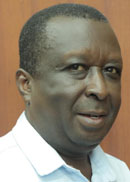
The author is the Uweshirifa Minister of Information, Media and Communications in the Institution of the Umukuuka. He is also Founding Director of Vicnam International Communications Ltd, a private firm of communications, public relations and information management consultants. He specialises in the Proofreading and General Editing (PAGE) of documents and can be contacted by Tel: (+256)752-649519 and by Email: agmusamali@hotmail.com.
 The Independent Uganda: You get the Truth we Pay the Price
The Independent Uganda: You get the Truth we Pay the Price




Well elaborated details and concerns in the preservation of our culture.
Banamasomelo assuming cultural leadership are twisting the mode of leadership from moral authority built from bottom up to formal authority commanding from above – this kind of leadership will always rely on begging to enforce foreign system contrary to the basic culture.
The institution of Umukuuka also sounds a new formation whose constitution is nowhere to be found and hence the unknown culture imposed on the known tradition.